【中考夺分天天练】2015届中考英语(全国·人教版)总复习+第一篇 基础巧过关:七年级下册+[Units+7—12](共57张PPT)
文档属性
| 名称 | 【中考夺分天天练】2015届中考英语(全国·人教版)总复习+第一篇 基础巧过关:七年级下册+[Units+7—12](共57张PPT) |  | |
| 格式 | zip | ||
| 文件大小 | 239.8KB | ||
| 资源类型 | 教案 | ||
| 版本资源 | 人教新目标(Go for it)版 | ||
| 科目 | 英语 | ||
| 更新时间 | 2014-12-12 20:39:55 | ||
图片预览

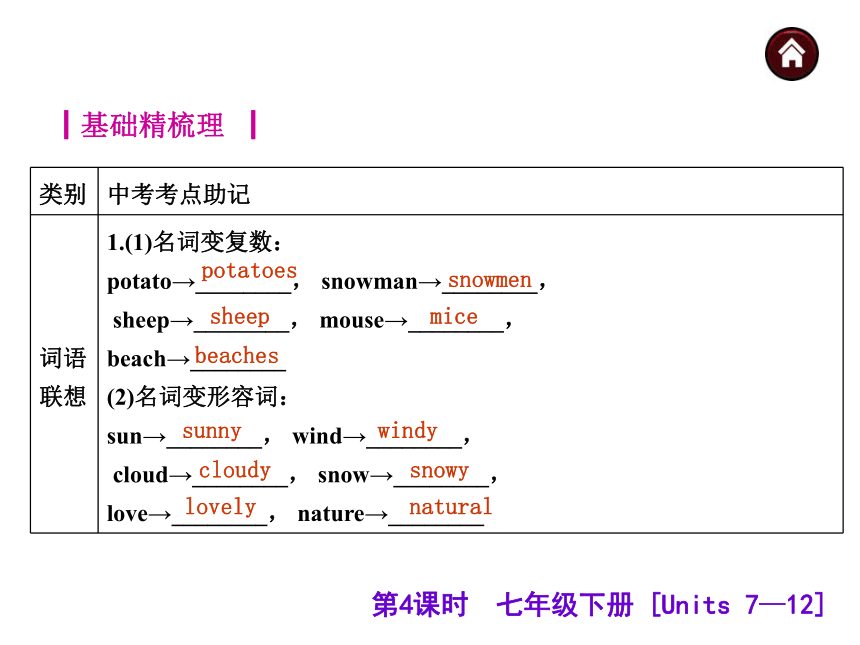
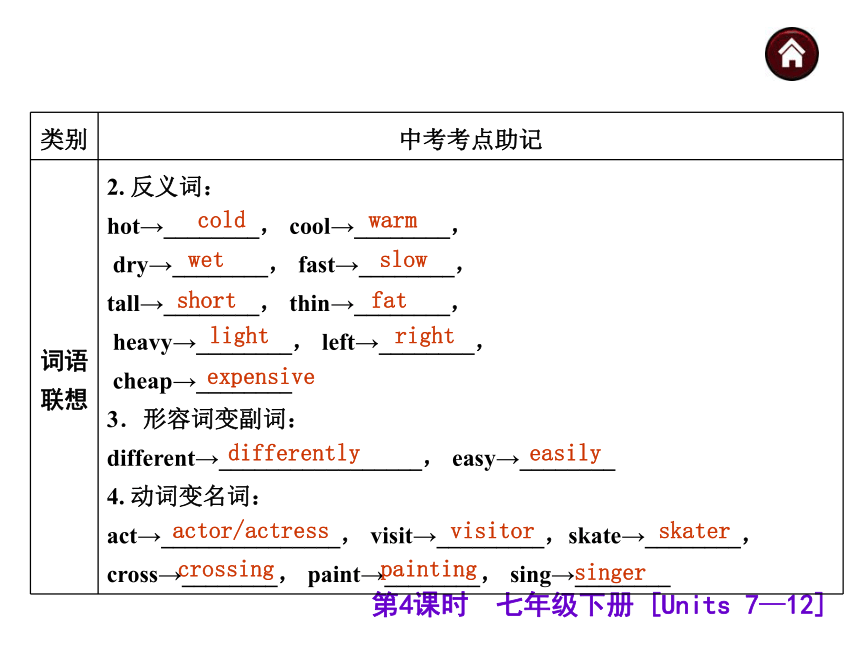
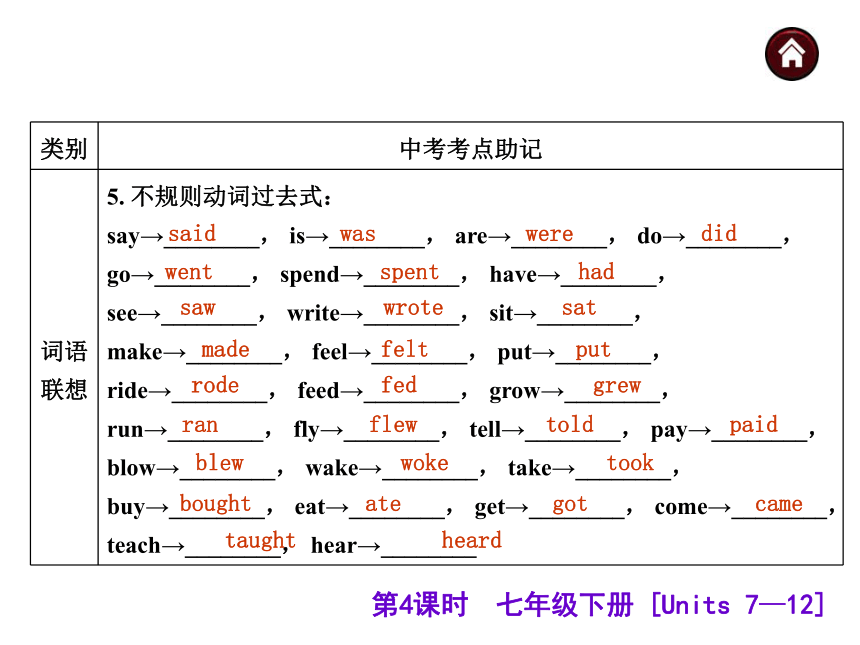
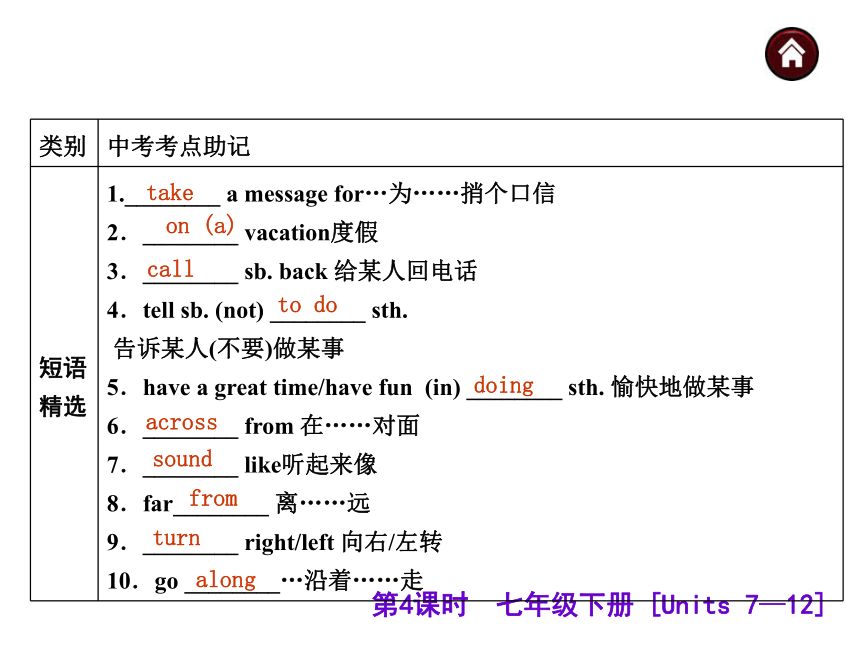
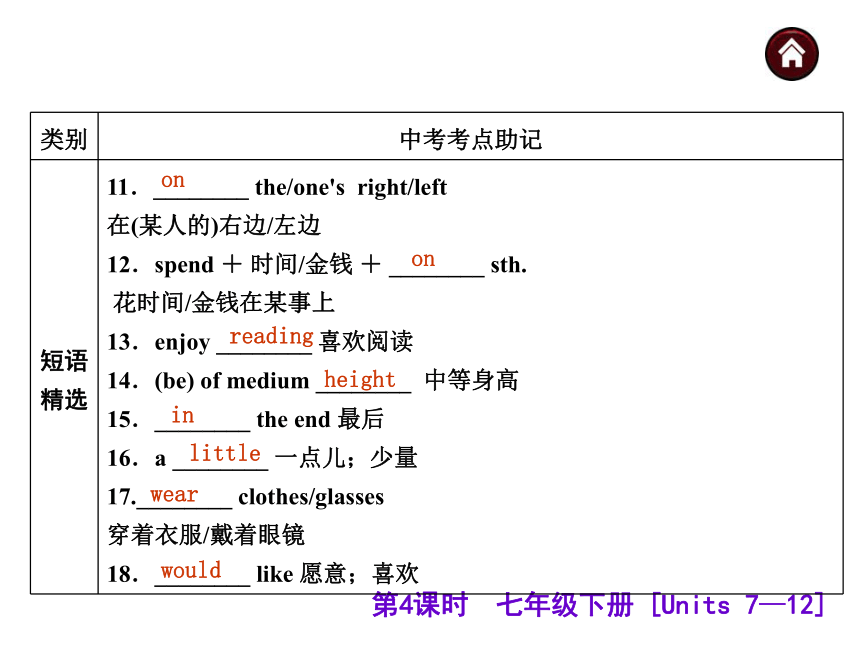
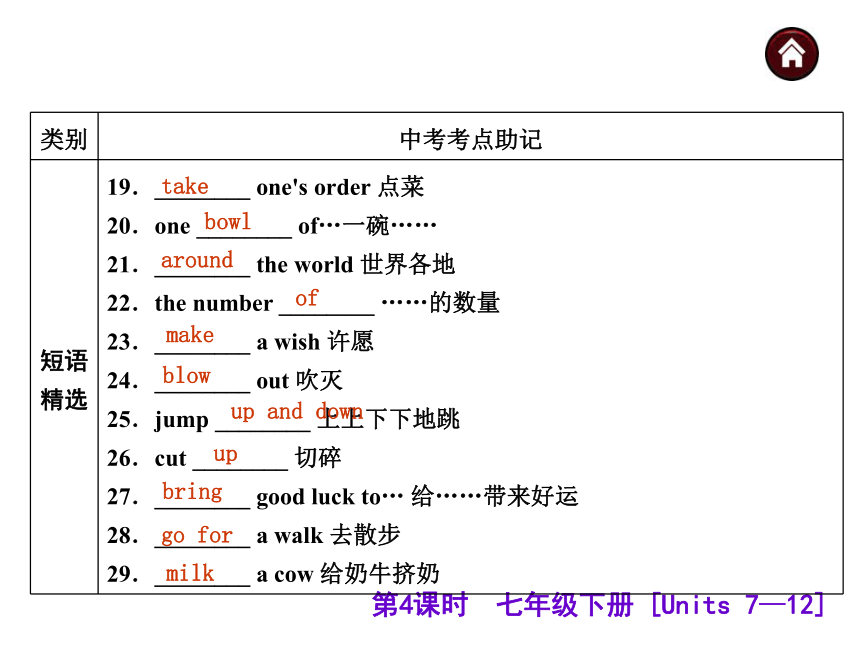
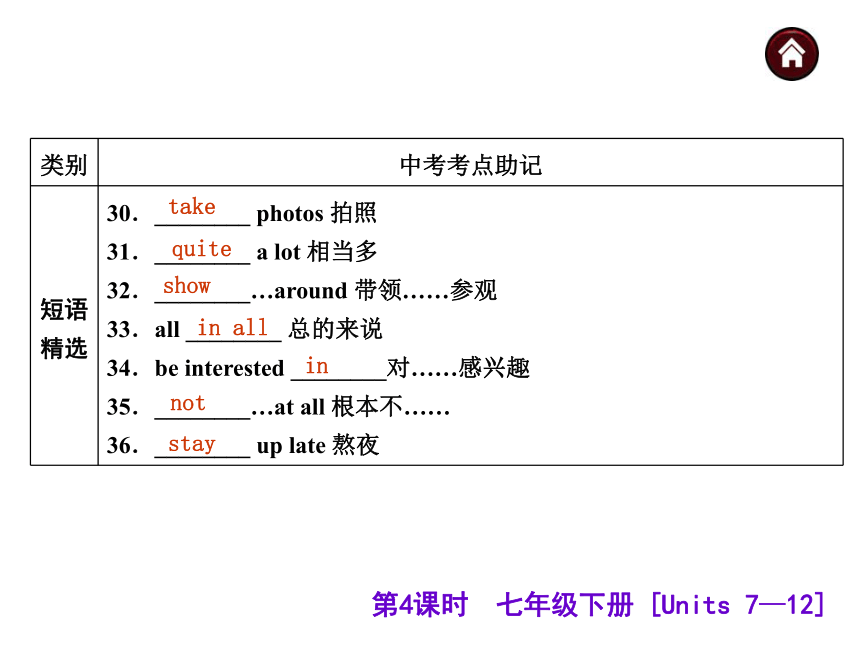
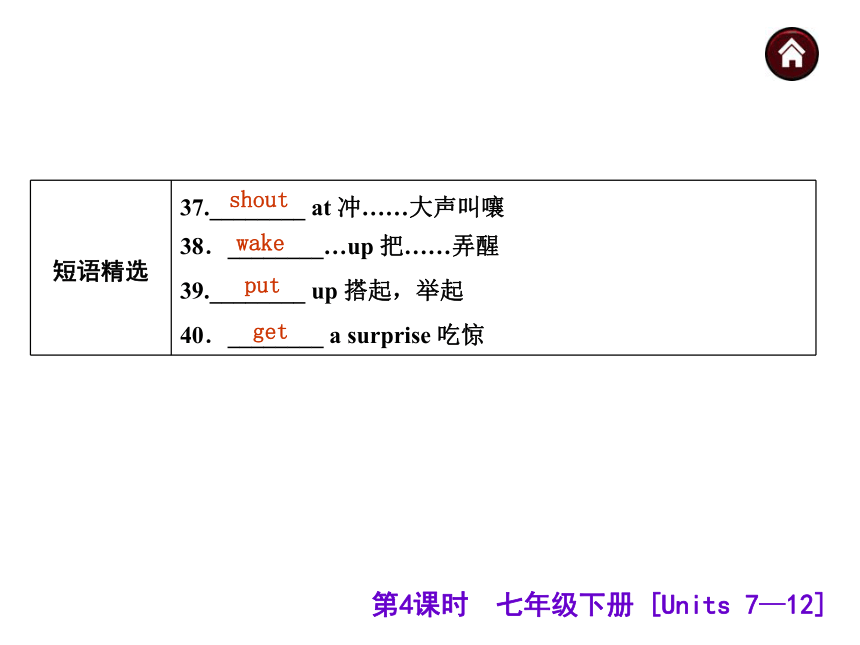
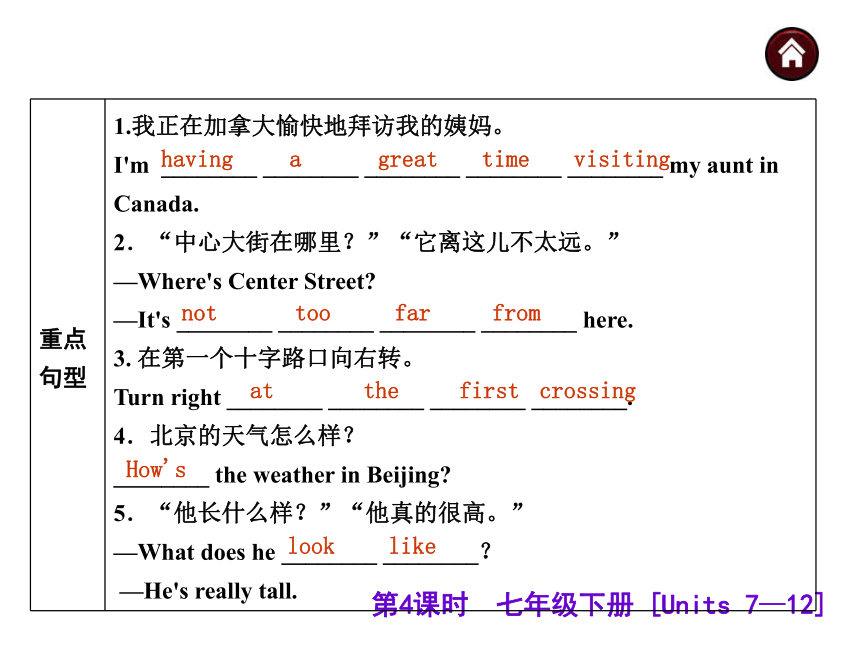
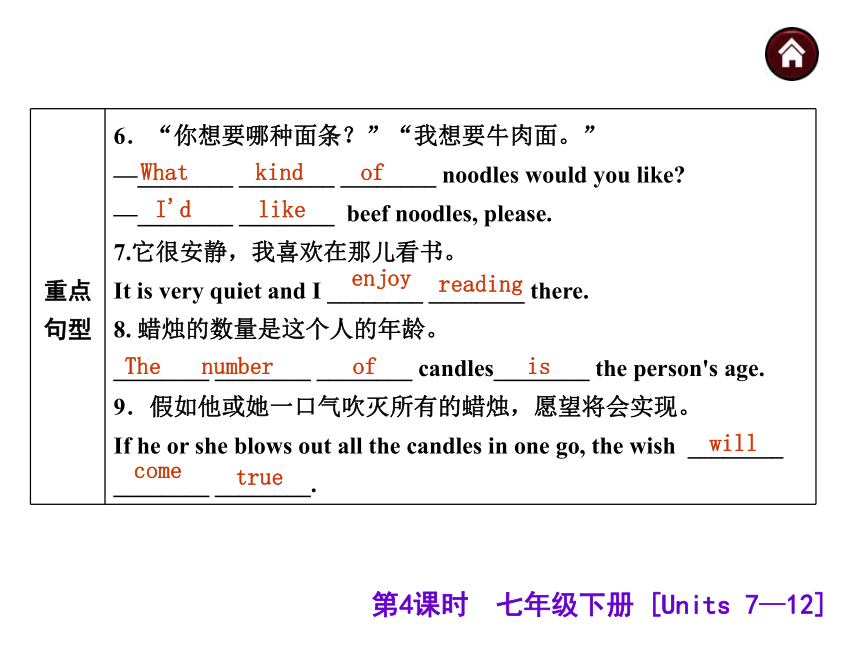
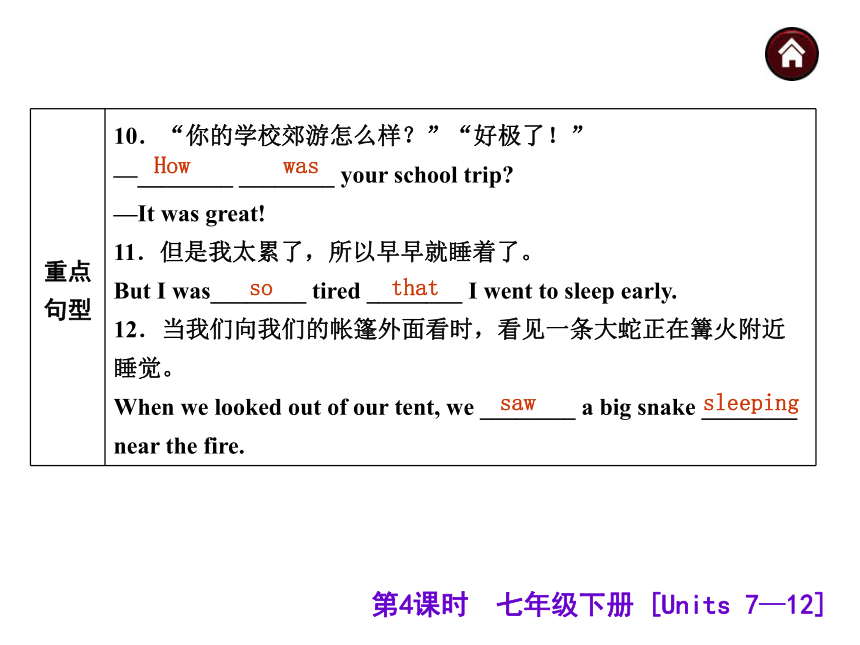
文档简介
课件57张PPT。第4课时 七年级下册 [Units 7—12]第4课时 七年级下册 [Units 7—12]┃基础精梳理 ┃potatoes snowmensheepmicebeachessunnywindycloudysnowylovelynatural第4课时 七年级下册 [Units 7—12]coldwarmwetslowshortfatlightrightexpensivedifferentlyeasilyactor/actressvisitor skater crossing painting singer 第4课时 七年级下册 [Units 7—12]said wasweredidwentspenthadsawwrotesatmadefeltputrodefedgrewranflewtoldpaidblewwoketookboughtategotcametaught heard第4课时 七年级下册 [Units 7—12] take on (a)callto dodoingacrosssoundfromturnalong第4课时 七年级下册 [Units 7—12]ononreadingheightinlittlewearwould第4课时 七年级下册 [Units 7—12]takebowlaroundofmakeblowup and downupbringgo formilk第4课时 七年级下册 [Units 7—12]takequiteshowin allinnotstay第4课时 七年级下册 [Units 7—12]shoutwakeputget第4课时 七年级下册 [Units 7—12]havingagreattimevisitingnottoofar fromatthefirstcrossingHow'slook like第4课时 七年级下册 [Units 7—12]WhatkindofI'd likeenjoyreadingThenumberofiswillcometrue第4课时 七年级下册 [Units 7—12]Howwassothatsawsleeping第4课时 七年级下册 [Units 7—12]第4课时 七年级下册 [Units 7—12]┃考点巧突破┃考点1 across/through/over/past/cross (1)across作介词,意为“从……表面穿过”时,指从某个范围的一边到另一边。across from意为“在……对面”。
He can swim across the river. 他能游过这条河。
(2)through作介词,意为“从……中间穿过”时,往往指穿过沙漠、森林,(光线)透过窗户等。巧辩异同第4课时 七年级下册 [Units 7—12]The river runs through the city.
这条河从这座城市中间流过。
(3)over作介词,意为“翻越”时,表示到达高的障碍物(如树、墙、篱笆和山脉等)的另一侧。
He jumped over the wall. 他跃过了墙。
(4)past作介词,意为“走过,经过”时,指从某物或某人旁边经过。
He walked past me without saying “Hello”.
他经过我身边时没打招呼。第4课时 七年级下册 [Units 7—12](5)cross作动词,意为“穿过”时,相当于go across。
The old man is crossing (=is going across) the road. 这位老人正在过马路。 第4课时 七年级下册 [Units 7—12]考点2 a number of/the number of Every year a number of people come to visit our school. 每年都有许多人来参观我们学校。
Now the number of family cars is much larger than before. 现在家用汽车的数量比以前多了许多。第4课时 七年级下册 [Units 7—12]考点3 in front of/in the front of (1)in front of 指在某个范围外部的前面, 反义词为behind。
(2)in the front of 指在某个范围内部的前面,反义词组为at the back of。第4课时 七年级下册 [Units 7—12]考点4 interesting/interested (1)interesting是形容词,意为“有趣的,引起兴趣的”,既能修饰人,也能修饰物。
This new TV play is very interesting.
这部新电视剧很有趣。
He's a very interesting man. 他是一个很有趣的人。 第4课时 七年级下册 [Units 7—12](2)interested也是形容词,意为“感兴趣的,对……有兴趣的”,主语一般为人。
At the age of eight, the girl became interested in boating. 八岁时,这个女孩就对划船感兴趣。第4课时 七年级下册 [Units 7—12]考点5 a few/few/a little/little [注意] a little还可用作程度副词,修饰形容词、副词或其比较级,而a few不能。
It is a little colder today. 今天有点儿更冷了。第4课时 七年级下册 [Units 7—12]考点6 other/the other/another 第4课时 七年级下册 [Units 7—12]Some people like walking. Some like running. Others(=Other people) like swimming.
有些人喜欢散步,有些人喜欢跑步,其他人喜欢游泳。 (这里“其他人”并非其他所有的人。)
He has two daughters. One is a nurse, the other is a worker.
他有两个女儿,一个是护士,另一个是工人。
After the boy ate one apple, he asked for another (one). 这个男孩吃完一个苹果后又要了一个。 第4课时 七年级下册 [Units 7—12]考点7 in the end/at the end of/by the end of 第4课时 七年级下册 [Units 7—12]Those kids laughed in the end.那些孩子终于笑了。
The bank is at the end of the street.
银行在街道的尽头。
They had planted six thousand trees by the end of last year.
到去年年底为止,他们已种植了六千棵树。第4课时 七年级下册 [Units 7—12]句型点击考点1 It is very quiet and I enjoy reading there. 它很安静,我喜欢在那儿看书。 [点拨] enjoy doing sth. 喜爱做某事
enjoy oneself=have a good time/have fun
玩得开心
They enjoyed themselves in the park.
他们在公园里玩得很开心。第4课时 七年级下册 [Units 7—12]考点2 But I was so tired that I went to sleep early. 但是我太累了,所以早早就睡着了。[点拨] “so+形容词或副词+that引导的结果状语从句”意为“如此……以至于……”。
He is so young that he can't go to school.
他年龄那么小以至于不能去上学。第4课时 七年级下册 [Units 7—12]考点3 How's the weather in Beijing?
北京的天气怎么样?[点拨] How's the weather? =What's the weather like? 常用来询问天气。weather 是不可数名词,不能用a或an修饰。
What fine weather it is! 多好的天气啊!第4课时 七年级下册 [Units 7—12]考点4 When we looked out of our tent, we saw a big snake sleeping near the fire.
当我们向我们的帐篷外面看时,看见一条大蛇正在篝火附近睡觉。
[点拨] hear/see sb. doing sth.意为“听见/看见某人正在做某事”。
I saw her going across the road.
我看见她正在过马路。第4课时 七年级下册 [Units 7—12][拓展] hear/see sb. do sth.意为“听见/看见某人做了某事”,do 表示动作已经完成。
I often hear the girl play the piano in the next room. 我经常听见这个女孩在隔壁房间弹钢琴。
第4课时 七年级下册 [Units 7—12]┃智能双提升┃基础过关Ⅰ.根据句意及首字母提示补全单词
1.I'm dreaming of a white Christmas because it never snows in w________ in Guangzhou.
2.“Jackie is of medium h________ ” means Jackie is neither tall nor short.
3.We are secretly preparing a birthday party to give Mom a s________. intereight urprise 第4课时 七年级下册 [Units 7—12]4.You'll get w________ if you go out now. It is raining.
5.Nobody can go a________the road when the traffic lights are red. It's dangerous.et cross 第4课时 七年级下册 [Units 7—12]Ⅱ.根据句意及汉语提示完成句子
1.Most foreign visitors are very __________(兴趣) in Chinese traditional culture.
2.This skirt doesn't fit me. Please give me ________(又一的) one.
3.The garbage __________ (短信) on cell phones are polluting the teens.
4.I hope __________(一切) goes well with you. interested another messages everything 第4课时 七年级下册 [Units 7—12]5.The cake that my father made is very ________ (美味的).delicious 第4课时 七年级下册 [Units 7—12]Ⅲ.按要求完成句子
1.Frank moved to Lanzhou in_2010. (对画线部分提问)
________ did Frank move to Lanzhou?
2.Sandra enjoys her stay in the city. (改为否定句)
Sandra ________ ________ her stay in the city.When doesn'tenjoy 第4课时 七年级下册 [Units 7—12]3.What do you think of the program called Daddy, Where Are We Going?(改为同义句)
________ do you ________ the program called Daddy, Where Are We Going?
4.The box is so heavy that we can't carry it.(改为同义句)
The box is ________ heavy for us________ carry.
5.Our school is beautiful. (改为感叹句)
________ ________ our school is!How like too toHow beautiful 第4课时 七年级下册 [Units 7—12]1.[2014· 黄冈] —What________ bowl of noodles would you like, small, medium or large?
—A large bowl of beef noodles, please.
A.color B.Price C.size D.kind中考透视C考查名词用法辨析。句意:“你想要多大碗的面条,小碗的、中碗的还是大碗的?”“请来一大碗牛肉面条。”根据large确定是问碗的尺寸、大小,所以选C。 第4课时 七年级下册 [Units 7—12]2.[2014·广元] —I'm afraid that I can't take a walk with you today, Jack. Maybe ________ time.
—What a pity(遗憾)!
A.another B.Other C.the otherA考查(the)other, another的用法。句意:“恐怕今天我不能和你去散步了,杰克。或许下一次吧。”“真遗憾!”another意为“又一;再一”,another time意为“下一次”;other意为“别的;其他的”,后跟可数名词时,应该用复数形式;the other意为“另外一个”,特指两者之中的另一个。 故选A。第4课时 七年级下册 [Units 7—12]3.[2014·滨州] —Excuse me, would you please speak a little more________?
—Sorry, I thought you could follow me.
A.sadly B.Quickly C.politely D.slowlyD考查副词的词义辨析。句意:“劳驾,请你说得慢一点好吗?”“抱歉,我以为你能跟得上。”sadly意为“伤心地”;quickly意为“快地”;politely意为“有礼貌地”;slowly意为“慢地”。 第4课时 七年级下册 [Units 7—12]4.[2013·衡阳] —Laura enjoys ________ storybooks.
—Me, too.
A.reading B.read
C.to read D.readsA第4课时 七年级下册 [Units 7—12]5.[2014·长沙] —Your brother is an excellent basketball player.
—So he is. He________ to play basketball three years ago.
A.has started B.Starts C.startedC本题考查过去时态的用法。句意:“你的哥哥是一位优秀的篮球运动员。”“他确实是。他三年前开始打篮球。” 根据时间提示词“three years ago”可知用一般过去时态, 故选C。 第4课时 七年级下册 [Units 7—12]6.[2014·广州] Be quiet! The students ________ a physics test in the next room.
A.had B.have had
C.were having D.are havingD考查动词时态。句意:请安静!学生们正在隔壁的房间进行物理考试。故选D。 主题写作 (二) 语言学习篇主题写作 (二) 语言学习篇话题分析命题者通常列举语言学习过程中出现的某一现象,要求考生针对该现象进行描述,并提出合理的建议并阐述自己的观点。主要涉及教学方式的变化、课堂学习方式、英语学习方法等。此类试题多以要点提示的方式来考查。主题写作 (二) 语言学习篇常用表达1.I enjoy learning English, but I am not good at it.
2.It is hard for me to understand other people when they talk.
3.I find English grammar is very hard to learn.
4.Could you please tell me how to improve my spoken English? 5.In English class, we should listen to the teacher carefully and take notes when necessary.
6.We should take part in all kinds of activities, such as reading, writing, having discussions and playing games.
7.It's very important to be confident when you learn a foreign language.
8.I think that doing lots of listening, speaking, reading and writing practice is the secret of becoming a good language learner. 主题写作 (二) 语言学习篇主题写作 (二) 语言学习篇典型例题假如你是韩梅,对英语很感兴趣,但不知如何提高英语听、说、读、写的能力,语法对你来说也是一大难题。因此,你打算给你远在加拿大的笔友Kate发一封电子邮件,谈谈这些问题。
注意:1.词数:80词左右;
2.文中不能出现真实的姓名和所在学校的名称及其他相关信息,否则不予评分;
3.邮件开头和结尾已给出,不计入总词数。Dear Kate,
I'm writing to you for some questions about learning English.________________________________________________________________________
I am looking forward to hearing from you soon.
Yours,
Han Mei主题写作 (二) 语言学习篇【审题思路】
1.找准关键点:英语学习的兴趣,面临的困难;希望得到建议。
2.写作方式:邮件
3.时态:一般现在时
4.人称:第一人称和第二人称 主题写作 (二) 语言学习篇【写作模板】主题写作 (二) 语言学习篇【佳作赏析】
Dear Kate,
I'm writing to you for some questions about learning English. I enjoy_learning_(enjoy doing的用法) English, but_(转折词的使用,流畅自然) I don't do well in it (结合要点:写学习英语很棘手). It isn't easy for me to understand other people when they talk. So_(连词的使用,过渡自然) I feel worried._I_think_(引出个人的看法) that主题写作 (二) 语言学习篇doing_lots_of_listening,_speaking,_reading_and_writing_practice_(动名词作主语) is the secret of becoming a good language learner (结合要点:写成为好的语言学习者的秘诀). Another thing that_I_find_very_hard_(that引导的定语从句) is English grammar (结合要点:写出了英语语法很难). However_(副词的使用,自然连贯), it is very necessary for me. Could you please tell me how you learn English in Canada (结合要点:提出问题)? Are you the same as we Chinese students?主题写作 (二) 语言学习篇I am looking forward to hearing from you soon.
Yours,
Han Mei主题写作 (二) 语言学习篇主题写作 (二) 语言学习篇自我挑战回想三年的英语学习历程,丰富多彩的英语课堂活动一定给你留下了许多难忘的回忆。请你以“What should we do in English class?”为题写一篇英语短文,谈谈在英语课堂上学生应该怎样做,才能使英语学习更有效。
提示:1.Listen to the teacher.
2.Take part in activities.
3.Be confident in ourselves.要求:1.须包括所有提示内容,可适当发挥。
2.词数:60—80词。
参考词汇:take notes, work in groups with…, not be afraid of…
What should we do in English class?
In English class,we should___________________________________________________________________ 主题写作 (二) 语言学习篇One possible version:
What should we do in English class?
In English class, we should listen to the teacher carefully and take notes when necessary. Try to answer questions in English.
We should take part in all kinds of activities, like reading, writing, having discussions and playing games. We need to work in groups with our classmates to help each other and learn from each other.主题写作 (二) 语言学习篇It's very important to be confident. Speak English loudly in front of the class and never be afraid of making mistakes. In this way, we can make much progress.主题写作 (二) 语言学习篇
He can swim across the river. 他能游过这条河。
(2)through作介词,意为“从……中间穿过”时,往往指穿过沙漠、森林,(光线)透过窗户等。巧辩异同第4课时 七年级下册 [Units 7—12]The river runs through the city.
这条河从这座城市中间流过。
(3)over作介词,意为“翻越”时,表示到达高的障碍物(如树、墙、篱笆和山脉等)的另一侧。
He jumped over the wall. 他跃过了墙。
(4)past作介词,意为“走过,经过”时,指从某物或某人旁边经过。
He walked past me without saying “Hello”.
他经过我身边时没打招呼。第4课时 七年级下册 [Units 7—12](5)cross作动词,意为“穿过”时,相当于go across。
The old man is crossing (=is going across) the road. 这位老人正在过马路。 第4课时 七年级下册 [Units 7—12]考点2 a number of/the number of Every year a number of people come to visit our school. 每年都有许多人来参观我们学校。
Now the number of family cars is much larger than before. 现在家用汽车的数量比以前多了许多。第4课时 七年级下册 [Units 7—12]考点3 in front of/in the front of (1)in front of 指在某个范围外部的前面, 反义词为behind。
(2)in the front of 指在某个范围内部的前面,反义词组为at the back of。第4课时 七年级下册 [Units 7—12]考点4 interesting/interested (1)interesting是形容词,意为“有趣的,引起兴趣的”,既能修饰人,也能修饰物。
This new TV play is very interesting.
这部新电视剧很有趣。
He's a very interesting man. 他是一个很有趣的人。 第4课时 七年级下册 [Units 7—12](2)interested也是形容词,意为“感兴趣的,对……有兴趣的”,主语一般为人。
At the age of eight, the girl became interested in boating. 八岁时,这个女孩就对划船感兴趣。第4课时 七年级下册 [Units 7—12]考点5 a few/few/a little/little [注意] a little还可用作程度副词,修饰形容词、副词或其比较级,而a few不能。
It is a little colder today. 今天有点儿更冷了。第4课时 七年级下册 [Units 7—12]考点6 other/the other/another 第4课时 七年级下册 [Units 7—12]Some people like walking. Some like running. Others(=Other people) like swimming.
有些人喜欢散步,有些人喜欢跑步,其他人喜欢游泳。 (这里“其他人”并非其他所有的人。)
He has two daughters. One is a nurse, the other is a worker.
他有两个女儿,一个是护士,另一个是工人。
After the boy ate one apple, he asked for another (one). 这个男孩吃完一个苹果后又要了一个。 第4课时 七年级下册 [Units 7—12]考点7 in the end/at the end of/by the end of 第4课时 七年级下册 [Units 7—12]Those kids laughed in the end.那些孩子终于笑了。
The bank is at the end of the street.
银行在街道的尽头。
They had planted six thousand trees by the end of last year.
到去年年底为止,他们已种植了六千棵树。第4课时 七年级下册 [Units 7—12]句型点击考点1 It is very quiet and I enjoy reading there. 它很安静,我喜欢在那儿看书。 [点拨] enjoy doing sth. 喜爱做某事
enjoy oneself=have a good time/have fun
玩得开心
They enjoyed themselves in the park.
他们在公园里玩得很开心。第4课时 七年级下册 [Units 7—12]考点2 But I was so tired that I went to sleep early. 但是我太累了,所以早早就睡着了。[点拨] “so+形容词或副词+that引导的结果状语从句”意为“如此……以至于……”。
He is so young that he can't go to school.
他年龄那么小以至于不能去上学。第4课时 七年级下册 [Units 7—12]考点3 How's the weather in Beijing?
北京的天气怎么样?[点拨] How's the weather? =What's the weather like? 常用来询问天气。weather 是不可数名词,不能用a或an修饰。
What fine weather it is! 多好的天气啊!第4课时 七年级下册 [Units 7—12]考点4 When we looked out of our tent, we saw a big snake sleeping near the fire.
当我们向我们的帐篷外面看时,看见一条大蛇正在篝火附近睡觉。
[点拨] hear/see sb. doing sth.意为“听见/看见某人正在做某事”。
I saw her going across the road.
我看见她正在过马路。第4课时 七年级下册 [Units 7—12][拓展] hear/see sb. do sth.意为“听见/看见某人做了某事”,do 表示动作已经完成。
I often hear the girl play the piano in the next room. 我经常听见这个女孩在隔壁房间弹钢琴。
第4课时 七年级下册 [Units 7—12]┃智能双提升┃基础过关Ⅰ.根据句意及首字母提示补全单词
1.I'm dreaming of a white Christmas because it never snows in w________ in Guangzhou.
2.“Jackie is of medium h________ ” means Jackie is neither tall nor short.
3.We are secretly preparing a birthday party to give Mom a s________. intereight urprise 第4课时 七年级下册 [Units 7—12]4.You'll get w________ if you go out now. It is raining.
5.Nobody can go a________the road when the traffic lights are red. It's dangerous.et cross 第4课时 七年级下册 [Units 7—12]Ⅱ.根据句意及汉语提示完成句子
1.Most foreign visitors are very __________(兴趣) in Chinese traditional culture.
2.This skirt doesn't fit me. Please give me ________(又一的) one.
3.The garbage __________ (短信) on cell phones are polluting the teens.
4.I hope __________(一切) goes well with you. interested another messages everything 第4课时 七年级下册 [Units 7—12]5.The cake that my father made is very ________ (美味的).delicious 第4课时 七年级下册 [Units 7—12]Ⅲ.按要求完成句子
1.Frank moved to Lanzhou in_2010. (对画线部分提问)
________ did Frank move to Lanzhou?
2.Sandra enjoys her stay in the city. (改为否定句)
Sandra ________ ________ her stay in the city.When doesn'tenjoy 第4课时 七年级下册 [Units 7—12]3.What do you think of the program called Daddy, Where Are We Going?(改为同义句)
________ do you ________ the program called Daddy, Where Are We Going?
4.The box is so heavy that we can't carry it.(改为同义句)
The box is ________ heavy for us________ carry.
5.Our school is beautiful. (改为感叹句)
________ ________ our school is!How like too toHow beautiful 第4课时 七年级下册 [Units 7—12]1.[2014· 黄冈] —What________ bowl of noodles would you like, small, medium or large?
—A large bowl of beef noodles, please.
A.color B.Price C.size D.kind中考透视C考查名词用法辨析。句意:“你想要多大碗的面条,小碗的、中碗的还是大碗的?”“请来一大碗牛肉面条。”根据large确定是问碗的尺寸、大小,所以选C。 第4课时 七年级下册 [Units 7—12]2.[2014·广元] —I'm afraid that I can't take a walk with you today, Jack. Maybe ________ time.
—What a pity(遗憾)!
A.another B.Other C.the otherA考查(the)other, another的用法。句意:“恐怕今天我不能和你去散步了,杰克。或许下一次吧。”“真遗憾!”another意为“又一;再一”,another time意为“下一次”;other意为“别的;其他的”,后跟可数名词时,应该用复数形式;the other意为“另外一个”,特指两者之中的另一个。 故选A。第4课时 七年级下册 [Units 7—12]3.[2014·滨州] —Excuse me, would you please speak a little more________?
—Sorry, I thought you could follow me.
A.sadly B.Quickly C.politely D.slowlyD考查副词的词义辨析。句意:“劳驾,请你说得慢一点好吗?”“抱歉,我以为你能跟得上。”sadly意为“伤心地”;quickly意为“快地”;politely意为“有礼貌地”;slowly意为“慢地”。 第4课时 七年级下册 [Units 7—12]4.[2013·衡阳] —Laura enjoys ________ storybooks.
—Me, too.
A.reading B.read
C.to read D.readsA第4课时 七年级下册 [Units 7—12]5.[2014·长沙] —Your brother is an excellent basketball player.
—So he is. He________ to play basketball three years ago.
A.has started B.Starts C.startedC本题考查过去时态的用法。句意:“你的哥哥是一位优秀的篮球运动员。”“他确实是。他三年前开始打篮球。” 根据时间提示词“three years ago”可知用一般过去时态, 故选C。 第4课时 七年级下册 [Units 7—12]6.[2014·广州] Be quiet! The students ________ a physics test in the next room.
A.had B.have had
C.were having D.are havingD考查动词时态。句意:请安静!学生们正在隔壁的房间进行物理考试。故选D。 主题写作 (二) 语言学习篇主题写作 (二) 语言学习篇话题分析命题者通常列举语言学习过程中出现的某一现象,要求考生针对该现象进行描述,并提出合理的建议并阐述自己的观点。主要涉及教学方式的变化、课堂学习方式、英语学习方法等。此类试题多以要点提示的方式来考查。主题写作 (二) 语言学习篇常用表达1.I enjoy learning English, but I am not good at it.
2.It is hard for me to understand other people when they talk.
3.I find English grammar is very hard to learn.
4.Could you please tell me how to improve my spoken English? 5.In English class, we should listen to the teacher carefully and take notes when necessary.
6.We should take part in all kinds of activities, such as reading, writing, having discussions and playing games.
7.It's very important to be confident when you learn a foreign language.
8.I think that doing lots of listening, speaking, reading and writing practice is the secret of becoming a good language learner. 主题写作 (二) 语言学习篇主题写作 (二) 语言学习篇典型例题假如你是韩梅,对英语很感兴趣,但不知如何提高英语听、说、读、写的能力,语法对你来说也是一大难题。因此,你打算给你远在加拿大的笔友Kate发一封电子邮件,谈谈这些问题。
注意:1.词数:80词左右;
2.文中不能出现真实的姓名和所在学校的名称及其他相关信息,否则不予评分;
3.邮件开头和结尾已给出,不计入总词数。Dear Kate,
I'm writing to you for some questions about learning English.________________________________________________________________________
I am looking forward to hearing from you soon.
Yours,
Han Mei主题写作 (二) 语言学习篇【审题思路】
1.找准关键点:英语学习的兴趣,面临的困难;希望得到建议。
2.写作方式:邮件
3.时态:一般现在时
4.人称:第一人称和第二人称 主题写作 (二) 语言学习篇【写作模板】主题写作 (二) 语言学习篇【佳作赏析】
Dear Kate,
I'm writing to you for some questions about learning English. I enjoy_learning_(enjoy doing的用法) English, but_(转折词的使用,流畅自然) I don't do well in it (结合要点:写学习英语很棘手). It isn't easy for me to understand other people when they talk. So_(连词的使用,过渡自然) I feel worried._I_think_(引出个人的看法) that主题写作 (二) 语言学习篇doing_lots_of_listening,_speaking,_reading_and_writing_practice_(动名词作主语) is the secret of becoming a good language learner (结合要点:写成为好的语言学习者的秘诀). Another thing that_I_find_very_hard_(that引导的定语从句) is English grammar (结合要点:写出了英语语法很难). However_(副词的使用,自然连贯), it is very necessary for me. Could you please tell me how you learn English in Canada (结合要点:提出问题)? Are you the same as we Chinese students?主题写作 (二) 语言学习篇I am looking forward to hearing from you soon.
Yours,
Han Mei主题写作 (二) 语言学习篇主题写作 (二) 语言学习篇自我挑战回想三年的英语学习历程,丰富多彩的英语课堂活动一定给你留下了许多难忘的回忆。请你以“What should we do in English class?”为题写一篇英语短文,谈谈在英语课堂上学生应该怎样做,才能使英语学习更有效。
提示:1.Listen to the teacher.
2.Take part in activities.
3.Be confident in ourselves.要求:1.须包括所有提示内容,可适当发挥。
2.词数:60—80词。
参考词汇:take notes, work in groups with…, not be afraid of…
What should we do in English class?
In English class,we should___________________________________________________________________ 主题写作 (二) 语言学习篇One possible version:
What should we do in English class?
In English class, we should listen to the teacher carefully and take notes when necessary. Try to answer questions in English.
We should take part in all kinds of activities, like reading, writing, having discussions and playing games. We need to work in groups with our classmates to help each other and learn from each other.主题写作 (二) 语言学习篇It's very important to be confident. Speak English loudly in front of the class and never be afraid of making mistakes. In this way, we can make much progress.主题写作 (二) 语言学习篇
